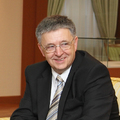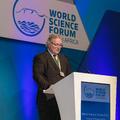World Science Forum 2007 lecturer: Professor Sir George Radda
Chairman, Biomedical Research Council (BMRC)
Emeritus Professor of Molecular Cardiology, University of Oxford
Sir George Radda (György Károly Radda) was born in 1936 in Hungary. In 1956, he attended Merton College, Oxford to study chemistry.
Sir George Radda is well known for his pioneering efforts in Nuclear Magnetic Resonance (NMR) methods used to study the human body; he published the first use of phosphorus NMR to study tissue metabolites in 1974. Since then, he has been actively involved in the development of this method for biochemical and clinical investigations especially in the area of cardiology and has won numerous accolades for his work on using non-invasive methods to monitor the inner workings of the human body.
Professor Radda has been involved with Singapore’s Biomedical Sciences initiative since 2003 when he first served as a member of Singapore’s Biomedical Sciences International Advisory Council. Professor Radda was a key driver in building up bioimaging capabilities in the basic and translational biomedical sciences. This led to the establishment of the Singapore Bioimaging Consortium (SBIC) in 2005 in which he is the Chairman from 2005 – 2010. He was also a key driver in building up bioimaging capabilities for clinical R&D in Singapore through the establishment of the Clinical Imaging Research Centre (CIRC) in 2007. The CIRC is one of the few facilities in the world dedicated to doing clinical R&D, using state of the art bioimaging tools developed by Siemens.
Professor Radda was instrumental in fostering scientific exchange and collaborations between Singapore and Hungary. This finally culminated with a Master Collaboration Agreement signing in 2007 between A*STAR and Hungary's National Office for Research and Technology (NKTH) to formalise both parties' commitment to promote scientific R&D and enhance human capital development. Since then, both A*STAR and NKTH have organized the inaugural joint grant call for proposals in September 2008. He was also part of the effort behind the agreement with Oxford University and A*STAR to offer a joint PhD program for the A*STAR Graduate Scholarship program. Professor Radda also has actively promoted A*STAR’s Singapore International Graduate Awards (SINGA) to potential students from Hungary and other Eastern European countries. For his efforts in developing of research in Singapore, Professor Radda was awarded the Public Service Medal in 2008. He was appointed as the Chairman of A*STAR’s Biomedical Research Council (BMRC) in October 2008 and also serves as chief scientific advisor to A*STAR’s Joint Council Office. He is also a member of A*STAR and BMRC Board.
Other appointments which he held during his distinguished career include being the Chief Executive of the United Kingdom’s Medical Research Council (MRC) from 1996-2003. During Professor Radda’s term as Chief Executive of the MRC, oversaw the inter-council working group on behalf of Research Councils UK to develop a combined strategy and vision for the 7 research councils in the UK. The result was the publication of two documents namely, “Strategies for Synthesis” and “A Vision for Research” on cross council research efforts. Professor Radda was also the British Heart Foundation Professor of Molecular Cardiology (1984-2003) and most recently, Professor and Head of the Department of Physiology, Anatomy and Genetics at Oxford University.
Professor Radda’s obtained his MA in Chemistry and D.Phil. in Physical Organic Chemistry at Merton College Oxford. His current research interests range from studies of enzyme regulation, bioenergetics and in-vivo biochemistry in relation to human disease, in particular heart disease. For his pioneering efforts in establishing clinical NMR, he has received numerous honors, such as being elected as a member of the Royal Society in 1980, made a Commander of the British Empire in 1993 and knighted in 2000. He has also won many awards such as the British Heart Foundation Gold Medal in 1982, the Buchanan Medal of the Royal Society in 1987 and most recently, the Medal of Merit from the International Academy of Cardiovascular Sciences in 2006.
Sir George Radda 2011.
Sir George Radda: “Új tudomány jöhet létre” (VIDEÓ)
„Drámaian megváltozott tudomány, főként a biomedicinával összefüggő tudomány az elmúlt húsz évben. Hatalmas információ áll rendelkezésünkre a génekről, a sejtekről, az élő szövetekről, az egész fiziológiáról. Ha nem integráljuk az ezekkel kapcsolatos információkat, sosem értjük meg teljesen az életet. Ezért nagyon fontos, hogy a különböző tudományágak ne csak együtt dolgozzanak, de próbáljanak együtt is gondolkodni a világ nagy kérdéseiről. A különböző tudományágak összefűzése révén teljesen új tudomány jöhet létre” – egyebek mellett erről is beszélt Sir George Radda, a világ egyik legjelentősebb tudománypolitikusa, a Semmelweis Budapest Award idei díjazottja.
A Semmelweis Egyetem legrangosabb tudományos díját pénteken adta át Dr. Tulassay Tivadar rektor az MRI-vizsgálatok magyar származású atyjának, egy ünnepi szimpózium keretében. Sir George Radda úgy látja, az új tudomány-felfogás megteremtését az oktatásban kell elkezdeni. Most kémikusnak, biológusnak vagy éppen mérnöknek tanulhat valaki, a különböző területek tudósai pedig jóformán alig értenek szót egymással, nem beszélik ugyanazt a nyelvet. A 21. században azonban más típusú tanításra van szükség, azt kell megvizsgálni, melyek a fő problémák a minket körülvevő világban, s ezek köré kell szervezni a tudást – fejtette ki a professzor.
Sir George Radda, aki jelenleg egy szingapúri központú tudományos ügynökség orvosbiológiai kutatótanácsának elnöke, arról is beszélt, milyen kiugrási lehetőségei vannak Magyarországnak. „A tudomány ma már globális. Ha valaki ezen a globális piacon versenyképes akar lenni, ki kell találnia miben jó, mire koncentrál. A magyarok mindig nagyon erősek voltak a matematikában, biomatematikában, a számítógépes analizációban, idegtudományokban. Ezekre kell tehát építkezni, ez az az irány, amerre el kell indulni, ahhoz hogy versenyképes legyen Magyarország” – mondta kérdésünkre.
Sir George Radda beszélt arról is, hogy régen elhagyta Magyarországot, s csak az utóbbi 8-10 évben kezdett visszajárni, kifejezetten a Semmelweis Egyetemre. Szinte minden évben tartott itt előadásokat, kurzusokat. Éppen ezért a Semmelweis-et Oxford után második egyetemének tartja, így különösen sokat jelent számára ez a díj.
Sir George Radda a Semmelweis Egyetemnek adott interjújában arról is beszélt, milyen kutatási területeken dolgozik jelenleg aktívan. Erről is olvashatnak a Semmelweis Egyetem újság következő számában, amelyben teljes terjedelmében közöljük a Semmelweis Budapest Award idei díjazottjával készített interjút.



